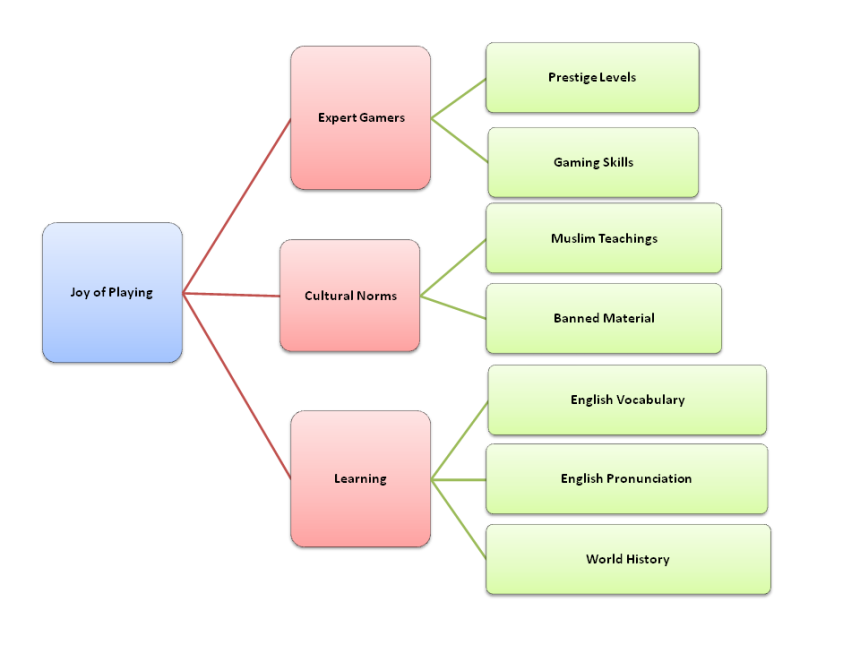Saudi ELLs Digital Gameplay: A Case Study
Note: The following blog post is an excerpt from my qualitative case study with 11 Saudi college-aged students conducted in 2014. Contact me if you’re interested in reading the entire paper.
I conducted a single instrumental case study to understand the digital game usage of the dominant culture of English language learners (ELLs) at my university, as well as their personal attitudes and cultural views toward gaming. The main purpose was to obtain qualitative data on the bounded system of Saudi college students attending an English language center (ELC) in regards to their gaming habits in order to add to the literature on gaming for educational purposes. I wanted to see if gaming was a good fit for language learning. My study focused on the intermediate, advanced, and university (bridge) level Saudi ELLs’ usage of digital gaming during and after school in the U.S. and Saudi Arabia. Saudis are the dominant language group not only at this ELC but nationwide. In fact, the number of Saudi enrollments for English language in the U.S. has grown from 11,116 to 71,026 in the past eight years (Marklein, 2013). Therefore, research on their learning habits and cultural norms are critical for U.S. colleges.
What types of non-educational digital games do Saudi students play after school in Saudi Arabia? Participants played adventure (e.g., Grand Theft Auto, Pepsiman, and Trivian), beauty (e.g., Sally’s Salon), community (e.g. The Sims™), historical (e.g., Assassin’s Creed®), sports (FIFA soccer, Forza Motorsport, and Driver), war (e.g., Battlefield and Call of Duty®), and westerns (e.g., Red Dead). These games can be played as MMORPGs or offline individually. Overall, Call of Duty® (COD) was the most popular game among participants.
What type of non-educational digital games do Saudi students play after school in the United States? Some participants reported not having any time to play games after school due to their course load, while others either brought their Xbox or PlayStation consoles with them or purchased them here. A serious student stated, “I came to study, not to play. Perhaps during break.” Female students were more likely to play games on Facebook like The Farm or Candy Crush, or apps on their phones like Sally’s Spa. One male student reported playing Lumosity. Overall, those that played digital games in the U.S. reverted to the aforementioned ones, and COD remained the game of choice.
Do Saudi students believe that they can learn English from playing digital games? Participants strongly believed that they could learn English from playing digital games. One student claimed, “I got my language from PlayStation characters, to be honest. I don’t care about level. I care about history. I get two things: language and history.” Some were specific and stated that they learned new vocabulary but not grammar or pronunciation. Another participant reported learning English idioms from gaming, “Yes, sometimes, you talk with players from U.S. by using headset, and learn vocabulary from game they don’t teach in ESL class, example, ‘Free for all’.” A participant alluded to digital gaming teaching him “to speak with English speakers to know what to do or something.” They also felt that gaming would be a nice way to learn in class. Many students referenced playing COD with headsets “to talk to lots of friends.” A female student reported learning English from The Sims even though the characters don’t speak English; they speak Simlish. She stated, “I learned a lot of words from this game. Message and icon are in English. I learned a lot from this game because I love it. I played it for three years. I have big family, and they became rich.” Both males and females reported learning English from commercial digital gaming.
Marklein, M. B. (2013, January 15). Saudi students flood U.S. colleges for English lessons. USA Today. Retrieved from http://www.usatoday.com/story/news/nation/2013/01/11/saudi-students-english-class/1827465/
Rogers, S., & Johnson, R. B. (2014). Saudi English language learning college students’ digital gameplay: A case study. [Unpublished work].

Here’s a link to my paper: https://www.scribd.com/doc/259166433/Case-Study-of-Saudi-English-Language-Learners-Digital-Gameplay
LikeLike
Here’s a link to my poster presentation on this topic at the University of South Alabama’s Graduate Research Forum: https://drive.google.com/open?id=0B0-lCvj_EoxrZHlzbE1wSm5McFE&authuser=0
LikeLike
wow… I have never read about so many digital games!! Thanks for having shared them! Smiles from Argentina, Maria 🙂
LikeLike
Maria, I just updated this blog and noticed you had left a message. Thank you very much for your feedback. Keep on smiling!
LikeLike
Pingback: Saudi ELLs Digital Gameplay Habits: A Case Study | South Alabama Gaming Educators (SAGE)
Pingback: Saudi ELLs Digital Gameplay Habits: A Case Stud...